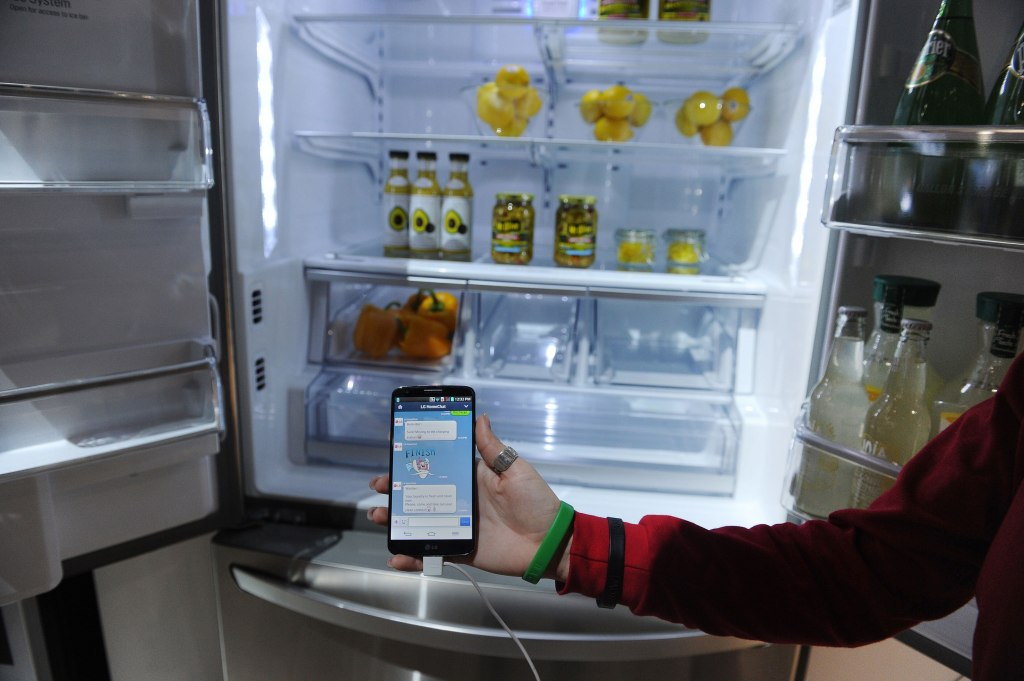Today’s retail economy is focused on acquisition and retention costs. Getting into people’s homes and turning them into long-term brand buyers is the goal, and appliance makers control an untapped resource — the Internet of Things (IoT) — that can effectively extend a brand or retailer’s supply chain visibility into the home.
How will the IoT manifest itself in the home? For many consumer brands and retailers, there’s always been one door that holds the key to the $65 billion a month American households spend on food: the refrigerator door. For example, at this year’s CES, Samsung introduced a refrigerator touted as truly “smart,” with connected cameras inside the fridge, an ability to run Pandora with built-in speakers and even grocery shopping through Amazon’s Alexa or a new, dedicated app called Groceries by MasterCard.
By building smart fridges that can track consumption, deliver offers and manage purchasing and replenishment, manufacturers can extract subsidies from companies in order to tap into data and the revenue stream of each consumer, then provide them with a free refrigerator.
Subsidies have long been a tool for both customer lock-in (think of InkJet printers sold at a loss to open the revenue stream for ink) as well as recurring revenue models (such as Verizon trading a $650 iPhone for the chance at triple the revenue in yearly billings). The smart fridge brings both of these models into play.
With a connected fridge, advertisers will pay to promote products to the consumer on the refrigerator’s screen, who will then use a related subscription-based service to buy the products. What makes promotion like this appealing to advertisers is that it’s data-driven, personalized and proactive.
It’s the same reason Google acquired Nest and Apple built HomeKit: It puts them inside the consumer’s house and gives them the ability to be “first to market” when a need arises. Like Valleywag’s Sam Biddle tweeted after the Nest acquisition, “If your house is burning down you’ll now get Gmail ads for fire extinguishers.”
In the same way, imagine receiving a $0.50 coupon for Heinz ketchup just as you toss your empty bottle. Or better yet, what if you got a coupon for a free bottle of Del Monte ketchup? Would you not try it? And what if this happened in hundreds of thousands of homes? Del Monte, by way of example, stands little chance in the battle over supermarket shelf space, but may find a way to challenge Heinz’s near 60 percent market dominance by going directly to a consumer’s fridge.
Food is a recurring purchase, with most Americans buying the same brands over and over again. While a bottle of ketchup does not have the lock-in protection of InkJet cartridges, the smart fridge provides a way to keep the purchase cycle going through replenishment reminders and promotions. It will play a central role in ensuring the consumption of the same food brands — or help drive consumers to a competitor.
Nothing in this life is free, so how will advertisers and retailers make back the cost of subsidizing these “free” fridges? By tapping in to years of food purchases via the fridge. There will have to be some manner of contract (just like with cell phone carriers) to ensure users behave as intended and buy what the fridge recommends or buy goods from a certain store. Users will see workflows and behaviors that have been made most famous through Amazon, such as:
- Recommendations — If the smart fridge knows what it contains, it can make recipe recommendations, which may or may not encourage the purchase of an additional item (e.g. you have lettuce, tomatoes and bread, why not buy some delicious Oscar Mayer bacon and have a BLT tomorrow?).
- Subscriptions — By incorporating features similar to Amazon’s Subscribe and Save program, the fridge can ensure rapid, automated replenishment that eliminates the window to change brands and keeps products on hand for continued consumption.
- Auto purchase — Despite the ridicule of Amazon’s Dash Button, automatic purchases are the wave of the future. Fridges will log consumption and enable users to auto-purchase depleted goods. It’s this sort of mindless, one-click (or no click) transaction that is the ultimate in retention methodology.
While the smart fridge brings convenience and new features to consumers, it is also interesting to consider what consumers could provide to brands, retailers and each other through machine learning and artificial intelligence.
Look at the success of an app like Waze. Its power comes from the volume of people using the software and making recommendations. You could see the same collective intelligence arise within the smart fridge. What if Del Monte actually does make better ketchup than Heinz, but we just don’t know about it? A connected fridge could provide new insights into tastes and preferences, helping bring better product awareness to the public. It can also provide superior consumer intelligence that food and beverage companies could only dream about when trying to understand buying and consumption habits.
The idea of a free refrigerator may seem radical today, but it’s a concept that has proven successful in other industries — and the technology exists to make it work. Ultimately, the consumers are the ones holding the key to the smart fridge’s future. Are we ready to share the details of every late-night snack, or will the fridge be the line that we draw when it comes to sharing our private information with commercial organizations?































Comment